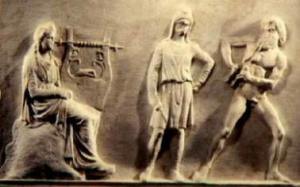I’ve been in absentia for a while…. at first because I was finishing the book (got it done the day before Thanksgiving!), then because I was in recovery, then catch-up with other stuff. But also, writing for me is like making a fire. It can be very hard to start up, and may have to smolder awhile before it catches. Then, when it does, the blaze is fierce, consuming everything standing in its way. As it dies out, sparks remain that still can be ignited. (I was tinkering for days even after I’d sent the manuscript off.) But now that it’s been dormant for a couple of weeks, the fireplace is stone, cold dead. I even have trouble writing emails! It’s another reminder for me of how much the writing process, even when you are extremely disciplined, is organic: although we can harness it, train it, contain it, we can’t really bend it to our will. And that’s the way it should be!
In my graduate writing seminar, I introduce the notion that two “gods” govern writing: Apollo and Dionysus. (You can make them female if you like!) Apollo is the critic, the editor, the pruner, shaper, bringer of order to the chaos. He clarifies, sculpts, is ruthless in getting rid of the extraneous, the unbeautiful, the ponderous. It’s essential for the writer to make friends with him, to learn that nine-tenths (probably a conservative estimate) of writing is actually re-writing. Unfortunately, too often we grow up experiencing him as the cruel “red pencil,” cold and unforgiving, who cuts at the heart, deflates the spirit, and robs us of our confidence in what we think and say. To escape his wrath, we cover our ideas with pretentious prose and verbal fog, learn to play by the “rules”—or just stop writing altogether. It breaks my heart—truly, I’m not indulging in sentimental exaggeration here—to see how many of my students have been depressed and deadened by the would-be gods of “rigor” and “professionalism.” We spend weeks in my writing course bumping those tyrants off their thrones.
Dionysus, the god of intoxication, is that unruly source of inspiration, creativity, desire, love, hunger that makes us want to write something in the first place. And after too many years being caged (by school, by lack of confidence, by self-doubt) we have to learn to release him, have to get in touch with what we really want to write about, what we love, what we fear, what we dream. For those of us who went through graduate school, this can be much harder than making friends with Apollo! (Actually, a lot of academic writing, while it looks like Apollo, in fact needs a good editor desperately.) But Dionysus can get out of hand, too—when we fall in love with, get drunk on our first ideas, our first drafts, or indulge in narcissistic self-disclosure (the most popular form of writing today, it seems), or are unable to hear criticism. So we spend a lot of time in my course learning to give and receive each other’s responses honestly but warmly. In this, I’m helped by two other metaphors: the sweetheart and the editor (I think these come from Natalie Goldberg). The sweetheart—who always speaks first! –looks for what is lovable, the editor looks for what could benefit from the clear (not cold, but clear) eye of Apollo. We never offer critique that doesn’t have both of these elements.
Experiences of your own to share?


 Purchase The Creation of Anne Boleyn: A New Look at England's Most Notorious Queen (US)
Purchase The Creation of Anne Boleyn: A New Look at England's Most Notorious Queen (US)